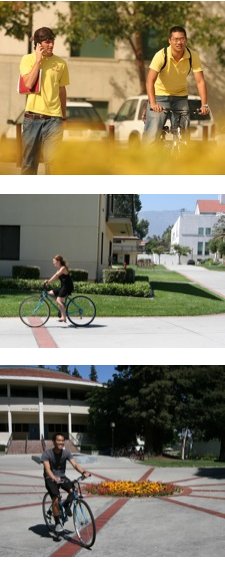 In a couple of months, the basement of Wohlford Hall will go from being storage space to a bicycle repair shop, and a place that loans bikes to students, faculty, and staff for free. The roll out of an official bike program at CMC not only signals an easier way to get around this fall, but should put an end to the abandoned bike population on campus, while also employing a small group of students to serve as bike shop techs.
In a couple of months, the basement of Wohlford Hall will go from being storage space to a bicycle repair shop, and a place that loans bikes to students, faculty, and staff for free. The roll out of an official bike program at CMC not only signals an easier way to get around this fall, but should put an end to the abandoned bike population on campus, while also employing a small group of students to serve as bike shop techs.
The techs, says CMC Vice President and Dean of Students Jefferson Huang, will handle simple repairs: repairing flats, adjusting brakes and chains, and filling tires. They also will be in charge of signing out loaner bikes for the day. "We won't be a place that sells bikes," Huang clarifies, "but we will loan some out, diagnose problems, make simple repairs, and refer more complicated repairs to local shops that can fix them."
In a place as "compact" as Claremont, Lucia Foulkes '10 says biking is the easiest way to combine a little exercise with running errands. During the past few years, she's used her bike to fetch groceries, visit a local nature preserve, and discover Claremont. It also came in handy getting to a class on a neighboring campus. "That equaled 15 more minutes to hit the snooze button," she says.
Foulkes says a campus bike shop will make it easier for people to choose riding over driving or walking, when it's practical to do so. "I can also tell you that wheeling a broken bike to a (repair) shop in the Claremont Village isn't fun, so I'm definitely looking forward to this addition!"
Her point about disabled bikes is one that Huang says contributed to the concept of a bike program at CMC. Year after year, the bike racks on campus tell an interesting story. "Many students bring a bike to campus, but most don't have an air compressor, or even a hand pump, nor do they have a way to put the bike in a car and take it to a bike shop," he says. "So, from something as small as a flat tire, the bike is neglected, and eventually, it becomes abandoned."
As a result each summer, Associate Director of Facilities and Campus Services Jose Huezo and his crew donate the functional ones to a charity; others are dumped. "Last year we didn't save any, but the year before we donated more than 15 bikes to Cedar House Rehabilitation Center. We've also given them to Goodwill."
Huang says a few simple resources in the bike shop will be able to keep otherwise neglected bikes running.
Replacing the College's old Student Escort Service, the new bicycle tech program will be marshaled by former bike shop owner Paul Miller, father of Adam Miller '03, assistant dean of admission. The elder Miller now serves as general manager for a group of bicycle shops (Cycle Werks) in South Orange County and has brought that expertise to bear in helping CMC roll out its own program.
"Paul is a great guy who made his career with bike shops, and he has a special fondness for CMC," Huang says. "He and a professional bike tech will conduct the training of our students in late August, in McKenna Auditorium. They will assemble our loaner bikes right out of the box, take them apart, put them back together again, and learn to make fine-tuning adjustments and repairs. We'll also provide some training on business-related issues, including the process of signing out loaner bicycles."
Set up of the bike shop also will be handled by CMCers. "We want the first crew of bike shop technicians to arrange it in a way that works for them," Huang says. "By being involved from the very beginning, we're hoping they'll have some pride in the shop."
Switching gears to more convenient transportation makes room for other obvious benefits, including environmental ones.
"Everything that we do to help promote alternative means of transportation for students, faculty and staff helps CMC in achieving its commitment to become carbon neutral," says Director of Facilities Brian Worley. "Because of the bike program, we will likely see an increase in bicycle use next year."
This is especially true, he says, in light of a new restriction for incoming freshmen this fall: No cars allowed. Along with Pomona and Pitzer colleges (Harvey Mudd is still considering a ban), CMC is prohibiting its entering class from bringing cars to campusa reality that may raise the visibility of two-wheelers.
Huang says a bike program also will be useful to students who don't already own bikes, but are looking for a quick way to get to the post office in the Village, or any number of local restaurants and shops.
Thanks to the Southern California climate, "our campus is perfect for bikes in that we experience no snow, little rain, no major hills or obstacles, and we have community trails for recreation, and college campuses nearby," Huang says. "When we talked to students about the bike shop, they got really excited about it. Many wanted to be among the first group of technicians that we will hire. Paul Miller said that an experienced bike technician can often find summer jobs and other jobs (perhaps while they're in graduate school) working in local bike shops."
CMC's bicycle shop is scheduled to open in September.
Switching Gears: New Bike Shop
Will Keep Students Rolling
